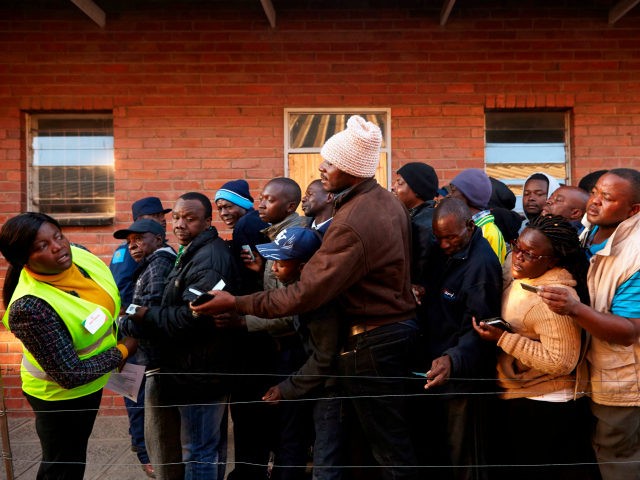Monday marks the first presidential election in Zimbabwe since longtime dictator Robert Mugabe was ousted in a surprisingly soft November 2017 coup.
The primary challenger to incumbent interim President Emmerson Mnangagwa, Nelson Chamisa of the Movement for Democrat Change (MDC), claims his party’s voters are being suppressed and Mnangagwa can only win if the election is rigged.
“There seems to be a deliberate attempt to suppress and frustrate the urban vote,” Chamisa tweeted on Monday, referring to long lines at polling places in the capital of Harare.
“The people’s will is being negated and undermined due to these deliberate and unnecessary delays,” he elaborated, suggesting the authorities are deliberately slowing down the voting process so MDC voters will run out of time to cast their ballots.
“Victory is ours!” Chamisa declared, later alleging that Mnangagwa can only win by rigging the vote in rural areas while suppressing the urban vote. Late polls gave Mnangagwa a very narrow lead, making a runoff election on September 8 appear likely.
Mnangagwa denied the vote-rigging allegations and offered assurances that Zimbabwe is “enjoying democratic space which has never been experienced before.”
The Zimbabwe Electoral Commission (ZEC) has denied previous allegations of electoral trickery made by Chamisa, although Reuters notes it did not comment on his latest charges.
Reuters fears that if Chamisa disputes the outcome of the election, it might lead to the kind of street violence that has killed dozens of people in past Zimbabwean elections. Chamisa’s penchant for confidently declaring the election is a “done deal” and his victory is assured unless Mnangagwa cheats will make his supporters unlikely to accept defeat with good humor.
Assurances have been given that everyone lined up to vote will get a chance to cast their ballot, as long as they are in line by 7 p.m. local time. Observers report voting appears to be proceeding smoothly at most polling places, long lines notwithstanding. Turnout is described as high in most areas, with voters in an upbeat mood.
Mugabe himself emerged from his enforced retirement to vote for the opposition in a rebuke to his former protege, Mnangagwa.
The symbolism of the old guard clinging to power is heavy in the contest between 75-year-old Mnangagwa, an enforcer for the Mugabe regime known as “the Crocodile” for his patience in stalking his prey, and 40-year-old Chamisa. Chamisa has unsurprisingly done well among young voters, the unemployed, and Zimbabweans frustrated by four decades of rule by Mugabe and Mnangagwa’s ZANU-PF party.
According to the BBC, almost half of the registered voters in this election are under the age of 35, which would bode well for Chamisa’s chances. On the other hand, many Zimbabwean voters apparently remain loyal to ZANU-PF and think Mnangagwa will reform the party now that Mugabe is gone.
The head of the Zimbabwe Electoral Commission told the BBC that 90 percent of polling stations opened on time, and officials are optimistic that all votes will be cast by 7 p.m.
A large number of observers from the European Union, the United States, and other African nations are on the ground in Zimbabwe to ensure an honest election. The observers have not said much in response to Chamisa’s allegations so far, although visiting former Liberian President Ellen Johnson Sirleaf stressed the importance of keeping the ballots secret so that Zimbabweans may vote without fearing reprisals.

COMMENTS
Please let us know if you're having issues with commenting.